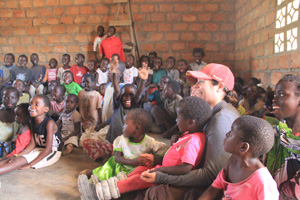 My name is Archange and I live in Kitabataba in the Democratic Republic of Congo. By the time I was five years old both of my parents had died. I was sent to live in many homes but no one wanted to take care of me. Everyone where I live is very poor and they do not have the money to feed another mouth. Eventually my grandparents said I could live with them. I was grateful they took me in but I was also really angry because for so many years no one wanted me. I was always just a burden, not someone’s son. Maybe my grandparents really loved me, but by this point I was so angry with everyone that I misbehaved a lot. They said I was very rebellious.
My name is Archange and I live in Kitabataba in the Democratic Republic of Congo. By the time I was five years old both of my parents had died. I was sent to live in many homes but no one wanted to take care of me. Everyone where I live is very poor and they do not have the money to feed another mouth. Eventually my grandparents said I could live with them. I was grateful they took me in but I was also really angry because for so many years no one wanted me. I was always just a burden, not someone’s son. Maybe my grandparents really loved me, but by this point I was so angry with everyone that I misbehaved a lot. They said I was very rebellious.
One day some adults came to my grandparents’ house. They were going through our community looking for children who needed help and they found me. When they heard that I was a naughty boy who had no parents they said they would take care of me. I would still live with my grandparents but they would come and visit me. And they do. They are Care Workers from Nyota Care Point, but to me they are my new mothers and fathers. When they visit we talk – we have talked about my behaviour and how I can grow up to be a nicer boy. They talk to me about God and how he loves me. I have been going to church and am on my church choir team.
Now I also get to eat with other children at the Care Point. We play together and I like getting to meet and know new friends. You would probably say I am a happy boy now, I smile a lot more. In this picture I am wearing my new school uniform! I am in grade 6 at Kitabataba Community School and I love school. I wish my parents were still alive but I thank God I have my grandparents and my new mothers and fathers. They really love me.













